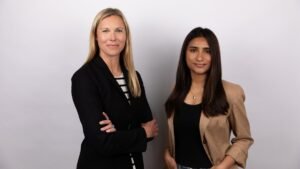Schools in the United States are facing a significant challenge in finding enough teachers to meet the growing demand for education. This shortage is further compounded for students with thinking and learning differences, as it is even more difficult to find teachers and specialists who are equipped to work with them.
Fortunately, Parallel Learning has developed a groundbreaking solution to this problem in the form of a teletherapy platform. Through partnerships with school districts, Parallel creates personalized plans for each student to ensure their unique needs are met.
In a recent announcement, Parallel revealed that it has successfully raised an additional $6.125 million in funding. The majority of this funding comes from Rethink Impact, a fund that focuses on supporting female and non-binary founders. The total Series A funding for Parallel now stands at $20 million and will be used for expanding into new territories and developing new products. This expansion will involve hiring licensed providers in each state where Parallel operates.
Founded in New York City three years ago, Parallel has already achieved significant growth. In the third quarter alone, Parallel’s provider network expanded by 200%. Even more impressive, 95% of these providers chose to remain with Parallel, resulting in 4 times the number of students being served in nearly 80 school districts. This also resulted in 4 times the revenue compared to the previous year.
The services offered by Parallel’s providers are diverse and comprehensive. They include specialized instruction, speech-language pathology, behavioral and mental health coaching, and executive function coaching for students. Parallel’s providers work closely with a school’s Special Education Program (SPED) to develop an individualized education program (IEP). In the United States, an IEP is a legal document outlining the personalized education plan for a student with special needs.
Parallel’s founder and CEO, Diana Heldfond, shared with TechCrunch that this mission holds a personal significance for her. Diagnosed with ADHD and dyslexia at a young age, Heldfond experienced firsthand the benefits of these support services. Her previous career on Wall Street and observations of investment in developmental services prompted her to develop a virtual care provider. When the pandemic hit and schools were struggling to support their students, Heldfond knew it was the right time to make her idea a reality.
One of the primary challenges that Parallel addresses is the shortage of providers in the fields of behavioral and special education. According to Heldfond, “Special education can be challenging since everything is handled at the district level. Each student receives different types of services, making it especially difficult for districts, especially those in rural areas. Imagine providers spending hours driving from one school to another – it’s a massive waste of time, especially considering the already significant shortage of these providers.”
To address this issue, Parallel offers a range of services that districts can choose from based on their specific needs. These services include assessments, mental health services, and specialized instruction. By partnering with K-12 public school districts and reaching out to special education directors and superintendents, Parallel ensures that the strengths and needs of each district are considered in the individualized education plans for their students.
Central to Parallel’s success is its community of providers. Their chief clinical officer, Dr. A. Jordan Wright, is a psychologist and author of the “Handbook of Psychological Assessment” and “Essentials of Psychological Tele-Assessment.” Parallel has also collaborated with clinical publishers, such as Pearson and Riverside, to incorporate learning materials, games, and activities into sessions – making them useful for children with shorter attention spans. The platform also has a library of clinical test materials for speech-language pathologists and school psychologists, and curricula for educators and service providers.
The company’s proprietary software also includes partnerships with evidence-based practice curriculum publishers. Their Enhanced GoalTracker allows for tracking a student’s progress on their IEP and generating individual progress reports – streamlining the process and saving time for the special education team.
At Parallel, collaboration is key. Once a plan is created, all parties invested in the student’s well-being, including providers, teachers, and family members, come together for an intake meeting. This meeting serves to create a comprehensive plan that takes into account each school district’s strengths – a vital aspect of Parallel’s business model.
Parallel is committed to preventing burnout among its providers. They achieve this by fostering a community among their providers, offering continuous education, mentorship opportunities, and room for growth within the company. Additionally, the provider-to-lead ratio at Parallel is 3 times lower than their competitors – enabling them to provide more support to their providers. They employ both 1099 and W2 employees who work remotely and are compensated hourly.
To meet the growing demand for their services, Parallel uses various methods to find and attract new providers. Word-of-mouth is one of their most successful methods, with current providers referring their peers. They also work closely with universities, especially graduate schools, to recruit future providers. Furthermore, Parallel has created a library of free resources for both internal and external providers, including professional development materials, white papers, and webinars.
Recently, Parallel announced the addition of five key hires to their leadership team. This includes Cern Veron, who will serve as the chief strategic growth officer after previously serving as CTO for GoHealth. Sarah Finney, formerly of Presence Learning, joins as the VP of customer success. Monica Maspons, who previously served as SVP of strategic growth at Acorn Health, will now hold the position of VP of strategic operations at Parallel. Kushal Patel, previously the senior director of strategic finance at Learneo, will serve as Parallel’s new VP of finance. Finally, Meryll Dindin, founding member and CTO of Polygon, joins Parallel as the director of data analytics and AI.
“Parallel’s innovative technology comes at a critical time when 42 out of 50 states are experiencing shortages of SPED teachers,” shares Rethink Impact founder and managing partner Jenny Abrasion in a statement. “Our firm has spent years seeking out solutions in special education, and we are incredibly impressed by the quality of what Diana and her team have built and how quickly they have scaled to support over 80 school districts.”








